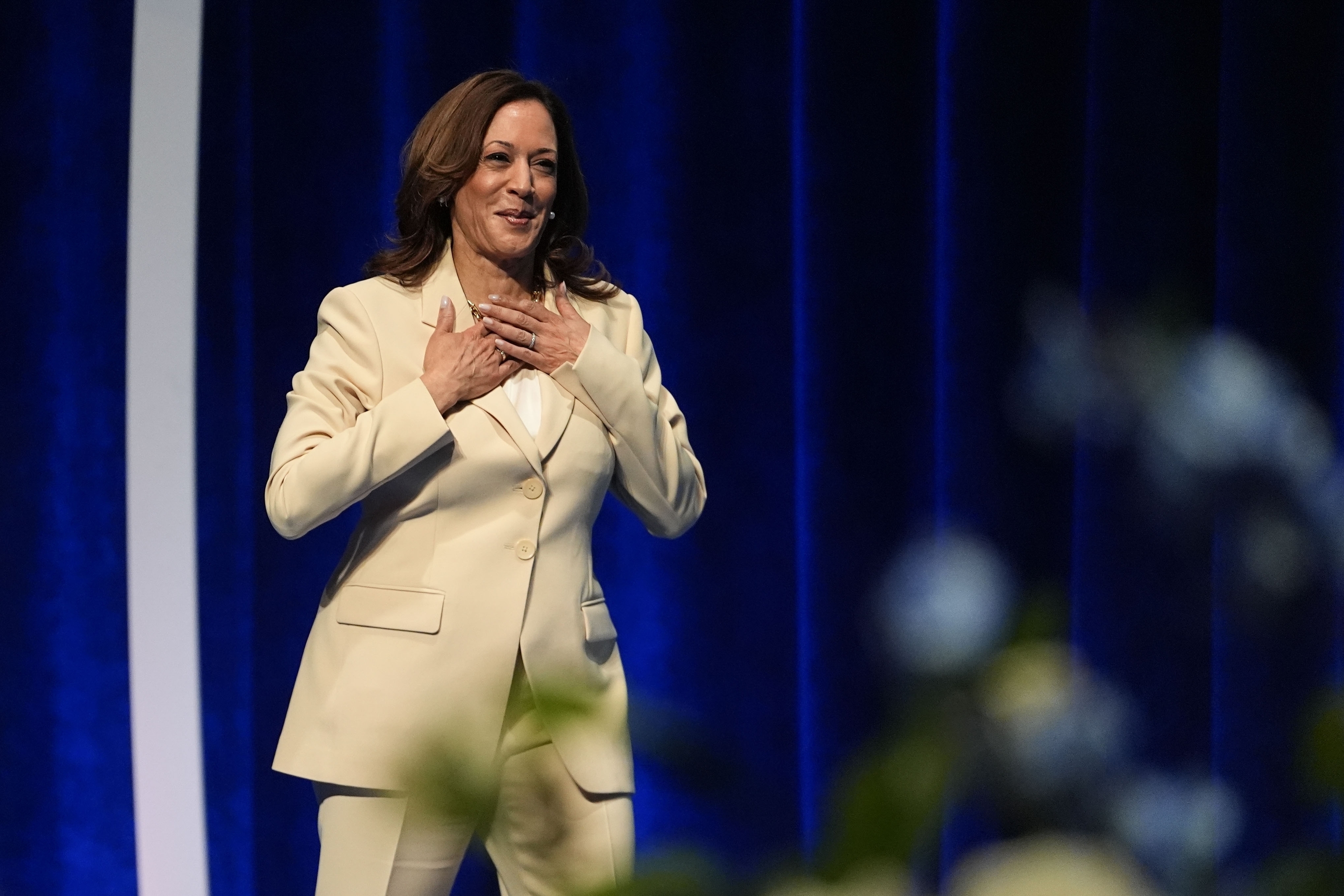Shortly after President Joe Biden left the race a week ago, Harris began to craft her own narrative around the economy by putting an emphasis on ending child poverty, promoting labor unions, reducing the costs of health and child care and protecting "dignity" in retirement.
Not once in speeches in Wisconsin, Indiana or Texas did she mention the word "inflation" — the overwhelming economic challenge that has dogged Biden's administration and forced him in remarks to consistently acknowledge voters' pain as they cope with higher grocery, gasoline, housing and auto expenses.
Harris is putting a bigger priority on what she says could be ahead.
"In our vision of the future, we see a place where every person has the opportunity not just to get by but to get ahead — a future where no child has to grow up in poverty, where every senior can retire with dignity and where every worker has the freedom to join a union," Harris told the American Federation of Teachers on Thursday.
But Republicans have moved quickly to try to blame Harris for the inflation that until recently they pinned on Biden. They are emphasizing the cumulative impact of high prices under the Democratic administration.
Labor Department data show that consumer prices are up 19.2% since Biden took office, while average hourly earnings have risen 16.9%.
GOP leaders are openly saying Harris contributed to the inflation without specifying how she managed to do so other than by being vice president.
"Vice President Harris owns this administration's record," said Senate Minority Leader Mitch McConnell, R-Ky. "Her fingerprints are all over the past four years of failure."
Past and current officials who worked with Harris said in interviews that there is an expectation that criticism on inflation will not stick to her because for many voters she represents a fresh voice after nearly eight years with either Republican Donald Trump or Biden in the Oval Office.
Now it's time for Harris to spell out her own policy positions on economic matters.
Some of those officials, who spoke on condition of anonymity because they were not authorized to publicly discuss political matters, said Harris is likely to stay in line with Biden's 2025 budget proposal and its plan to increase the corporate tax rate to 28% from the 21% set by Trump's 2017 tax overhaul.
Her emergence as the Democratic nominee has overlapped with positive economic news.
The Commerce Department said Thursday that the economy grew at an annual pace of 2.8% in the second quarter. On Friday, it reported that the personal consumption expenditures measure of inflation eased to an annual 2.5%, with financial markets now expecting a Federal Reserve interest rate cut in September.
Those who have known Harris for years said her work as a prosecutor in California caused a sense of fairness to be at the core of her economic policy ideas.
"She's a capitalist at heart — she wants businesses to do well," said Yasmin Nelson, a former senior adviser to Harris. "But she recognizes that the scales have been tipped toward them during the Trump administration. In her view, she wants to even the playing field."
Trump and his running mate, Sen. JD Vance, R-Ohio, are focused on portraying Harris as more liberal than Biden, suggesting that the former California senator would further restrict the use of fossil fuels in favor of solar, wind and other renewable energy sources.
Trump, at a rally in North Carolina on Wednesday, called Harris "the most incompetent and far left vice president in American history."
Vance went after her policies in a Friday interview on Megyn Kelly's SiriusXM program.
"We cannot let people who are going to destroy the American manufacturing and energy economy take over the reins of power," Vance said. "It's going to be a lot worse when you get somebody who's even more liberal than Biden in there."
The Trump campaign has quickly revived Harris' statements from her short-lived run for the 2020 Democratic presidential nomination. She said on CNN at the time that she favored banning plastic straws, offshore oil drilling and the use of fracking for oil and natural gas, a controversial stance in the swing state of Pennsylvania.
Republican lawmakers also say that Harris would raise taxes, which is only what Biden's 2025 budget plan would do for wealthier households and corporations.
The Harris campaign said that she does not support a fracking ban. During the 2020 vice presidential debate, she stressed multiple times that Biden would not end fracking.
The Energy Information Administration shows that both natural gas and oil production have increased to record levels during Biden's presidency after a pandemic driven dip. But the Biden administration's policies are more restrictive than what the GOP wants.
The bigger risk for Harris might be how the persistence of inflation shapes voters' views of the economy. Many economic models used by financial firms to analyze the election are based on the incumbent's party, not the candidate herself in this case.
The consultancy Oxford Economics said in an analysis Monday that the odds favored Trump. The forecast is based on models that use economic data. It does not necessarily account for social issues such as abortion and gun control that Democrats say will help them in the election.
The analysis stressed there is a high degree of uncertainty and noted that a lot could happen in the months ahead, though it is fairly straightforward in concluding that inflation is still a drag for the vice president.
"I doubt that Harris will significantly change how swing voters think of the economy," said Bernard Yaros, an economist at Oxford Economics. "She still carries that same baggage of presiding over the high inflation of 2021 and 2022. Like Biden, her approval took a hit during that inflation surge."
